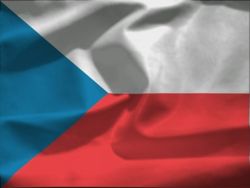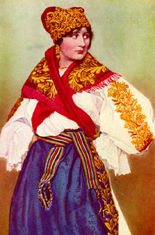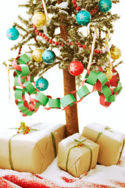Czech Republic Gift Giving Customs
From Giftypedia
Flag of The Czech Republic
Capital: Prague
Currency: the Czech crown
Language: Czech
- Considering a trip to Prague? The Czech Republic is a hot European destination. Renowned for its artwork, foreign visitors will notice beautiful works of art displayed in theaters and cinemas, libraries, galleries and concert halls.
- The Czech people are known to be friendly, polite and a bit conservative. The Czechs always greet one another everywhere they go. Visitors are expected to do the same. The official language spoken is Czech, so if you will be visiting the Czech Republic, “Dobr? den", means "Good day" and is a common greeting.
| Czech Republic Gift Giving |
|---|
|
Gift Giving Etiquette [1]
|
Souvenirs
The most popular souvenirs from the Czech Republic are products of skilled Czech craftsman. Shops are filled with handcrafted gifts of ceramic, clothes and fashion accessories. In Prague, shops beautifully display porcelain and Bohemian glass, recognized all over the world for its high quality.
A major treasure of the Czech Republic is the semi-precious Czech garnet, also known as Bohemian ruby.
Czech Traditions
Foreign visitors appreciate Czech traditions. Traditional costumes, still popular among the Czech people, are more visible in the village, especially in areas like the Moravian-Silesian region. Folk costumes, although not commonly worn, can still be seen worn during banquets, carnivals and traditional celebrations. These costumes are lavishly decorated with embroidery, beads and sequins. A headscarf covers the women’s hair, as it was once considered shameful to show their hair to anyone, even their men.
Food and Drink
- The Czechs are known for their delicious cuisine. The national food is pork, dumplings and cabbage. The meat is the foundation for the meal. Along with pork, beef and chicken are popular. Fish is uncommon, but may be served at Christmas.
- The Czechs are proud of their beer and renowned as having the best beer in the world. Because they never drink beer from a tin, beer in tins is exported. Czechs enjoy their pubs and often sit and drink until the pub closes. Because of this, waiters will continue to bring un-ordered beer to the tables. However, it is appropriate to refuse an un-ordered beer.
Christmas Traditions and Gift Giving
- According to NationMaster.com [2] the Czech population only consists of approximately 38% Catholics and 5% Protestants. But for these faithful, the Christmas celebration begins on Christmas Eve when the immediate family gathers for dinner. Superstition plays a big part in Czech Christmas celebration. The table is set with an even number of place settings to ensure that the same number of people will be present the next year. Believed to bring prosperity, a fish scale in placed under the dinner plates. Because it is considered unlucky to get up from the table, the table is loaded with food and sweets – everything that might be needed during the meal.
- A bell is rung when Baby Jesus (Ježíšek) has left presents under the tree for the children. The children rush in to open the gifts as the adults look on. At the end of the evening, the family will attend midnight mass.
- The Czech Christians continue to celebrate on December 25 by visiting family and enjoying meals such as baked duck or goose with cabbage and dumplings. Afterwards, the families will set out to visit their local churches and view the nativity scenes.[3]
Social Etiquette[4]
- Be careful discussing religion as most of the Czech Republic is an atheist and agnostic country.
- Know that Czechoslovakia was not part of the Soviet Union or the Russian Empire. Czechs don’t appreciate this assumption.
- Sports is a good topic of conversation, especially soccer and hockey.
- Do not discuss politics.
Related Items
- International Gift Customs
- How to Avoid Controversial or Inappropriate Gifts
- Etiquette for Office / Business Gift Giving






 Printer Friendly
Printer Friendly
